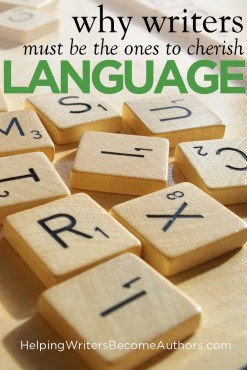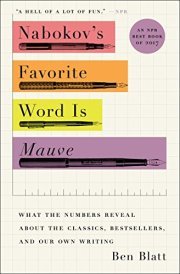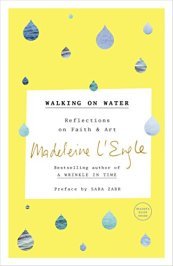Words Are Radical! (or, How to Cherish Language)
 Years ago, I was hiking with someone around the Scotts Bluff National Monument in western Nebraska. A bird flew over our heads, black against a metallic July sky. A lover of all things beautiful, my hiking partner was the first to point it out.
Years ago, I was hiking with someone around the Scotts Bluff National Monument in western Nebraska. A bird flew over our heads, black against a metallic July sky. A lover of all things beautiful, my hiking partner was the first to point it out.
I shaded my eyes. “Cool. What do think it is?”
He shrugged. “Don’t ask that. It diminishes it if you name it. If you have to put it in a box to understand it, you limit your understanding.”
He seemed to have a point. His comment was something I considered for a long time after that day—before realizing I completely disagreed with it.
Even today, I’m not sure what that bird was. I remember it as a black blob against the sky. I remember the feeling it gave me, seeing it floating lazily on a thermal. But I don’t actually remember the bird. If I’d recognized the bird as a vulture—or a bald eagle—or a red-winged hawk, then I’d probably remember him.
This is the value of language. Indeed, we might even say language is a value system. By its very nature, it assigns value to all the pieces of our life, and by extension to life itself.
All humans interact with language on some level or another. But as writers, no one is more intimately responsible for cherishing, protecting, and propagating language than we are.
Language Lost
 Statistician Ben Blatt highlighted some interesting insights when he mated words and numbers in the studies that created his book Nabokov’s Favorite Word Is Mauve. Using algorithms to recognize and observe patterns in hundreds of stories—everything from centuries of classics to reams of bestseller lists to entire libraries of fan-fic sites—he examined a number of curious trends within the history of literature.
Statistician Ben Blatt highlighted some interesting insights when he mated words and numbers in the studies that created his book Nabokov’s Favorite Word Is Mauve. Using algorithms to recognize and observe patterns in hundreds of stories—everything from centuries of classics to reams of bestseller lists to entire libraries of fan-fic sites—he examined a number of curious trends within the history of literature.
He looked at everything from authors’ most-used words (hmm, and Nabokov’s was…?) to phrasal differentiation between male and female writers to the prevalence of cliches to the likelihood of authors following their own writing advice.
All were fascinating. But what struck me most was his chapter “Guiltier Pleasures,” which examined the readability level of bestsellers over the years. I doubt his findings elicited great surprise from any quarter. What he found was a distinct trend away from big words and long sentences, toward “easier” prose.
Since reading is a learned skill with decided “levels” of proficiency, it makes perfect sense that the most popular books will always be those most accessible to the broadest reading base. It doesn’t necessarily mean “easy” books are better or worse than “advanced” books; it just means more people are likely to read them. As far as it goes, that’s all to the good.
What, in my opinion, is not so much to the good is the danger, inherent in this trend, of losing our language.
Language lost isn’t just sad for those of us who love words and who want to let rip with a good ol’ “somniloquent”* now and then without having the Flesch readability alarm suddenly go berserk on us. It’s disturbing because when we lose words, we lose more than just the ability to comprehend what we’re reading. We also lose a little bit of our ability to comprehend life itself.
*Is it telling that I just had to instruct Chrome to add “somniloquent” to my browser dictionary?
Hypocognition: A Road Map to Knowing the Unknown
Here’s another word Chrome doesn’t seem to know: hypocognition.
In all fairness, I didn’t know it either until I read Kaidi Wu and David Dunning’s insightful Scientific American post “Unknown Unknowns: The Problem of Hypocognition.”
Basically, hypocognition is simply “all the stuff you don’t know.” If, like me, you didn’t know what hypocogniton was, well, that’s hypocognition. Although hypocognition encompasses more than just an ignorance of terminology, words—or the lack thereof—is decidedly at its heart.
Wu and Dunning shared:
Consider this: how well can you discern different shades of blue? If you speak Russian, Greek, Turkish, Korean or Japanese, your chances are much better than if you speak English. The former groups have two distinctive linguistic representations of blue. In Russian, for example, dark blue (sinii) and light blue (goluboi) are as distinct as red and pink. But in English, we know blue as a single concept. The deprivation of finer-grained color concepts poses a great perceptual disadvantage. English speakers more easily confuse blue shades, not because we have poorer vision, but because we lack the more granular distinctions in the language we speak.
We can see the crossover here with the Baader-Meinhof Phenomenon, which Alan Bellows explains as the experience:
…where one stumbles upon some obscure piece of information—often an unfamiliar word or name—and soon afterwards encounters the same subject again, often repeatedly.
For example, I need to buy a car. In my research, I discovered that the Kia Soul seems to land on all the top 10 review lists for its class. I’d never even heard of the Soul before. I barely even registered Kia on my radar. But now, suddenly, Kia Souls are everywhere! Three in the same row at the grocery store on the same morning!
It wasn’t, however, the prevalence of the Souls that suddenly changed. It was my knowledge of the car’s existence and my subsequent ability to name it. Of course, I’d seen a Soul before. But because I had no language for it, it slid right through my awareness as if it didn’t even exist.
In short, you can’t notice what you notice until you notice it.
Language is one of the easiest and most powerful ways to notice not just life’s concrete aspects, but also the abstract.
Wu and Dunning again*:
Hypocognition also lies in the muddle of emotional experiences that we encounter but fail to explicate. We are hypocognitive amidst the rumbling moments of frustration when we are at a loss for words to describe how we feel. If there is any consolation, we could look to other cultural worlds to acquire an emotional lexicon that acknowledges these emotions. Ever felt the unspoken but mutual desire when looking into a loved one’s eyes? That’s mamihlapinatapei in the Chilean Yagán language. Ever felt the irresistible urge to pinch a baby’s cheek? That’s gigil in Tagalog.
*Basically, I just want to quote their entire amazing article, so please go read it.
Storytelling as the Art of Naming
I’m a namer. And I don’t just mean naming things like George the spider who currently lives in my desk plant. I mean that if I’m going to be able to understand things, I first need to be able to name them—to explain them.
Partly, this is just how my brain works. It’s a constant battle up there between vague intuitions and loud delineations.
Certainly, this is why I believe true mastery is found in a conscious application of unconscious skill. It’s also why writing this blog has been the single best tool for helping me improve my own writing. Being forced to put my ideas, theories, and understandings about storytelling into words other people can understand helps me understand them better than I ever would otherwise.
This compulsion to name is also, undoubtedly, why I am so deeply attracted to words. In my teens, I kept a folded piece of legal paper in the front of whatever book I was reading. When I found a word I didn’t know, I would save it on the paper. Later, I would look it up, write down its definition in a special notebook, then underline the word in the dictionary. Whenever I ran into an underlined word in the future, I’d always re-read it.
Perhaps regrettably, Kindles and mobile phones now make that all effort unnecessary. (These days, I sometimes find myself wanting to put my finger on an unknown word in a paperback book, forgetting it won’t immediately give me a pop-up definition.) Even still, I’ve always been thankful for the time (and the many notebooks) I used to immerse myself in words. I know what things are because of those words. Not as many things as I’d like to know, but more than I would have known.
If words are names, then writing is the art of naming. Indeed, I think storytelling is perhaps one of the most expansive human efforts to name our experiences and even our very existence.
 In her phenomenal affirmation of the writing life, Walking on Water, Madeleine L’Engle talked about how the true danger inherent in losing our words is the subsequent loss of our ability to use our stories to name. From her vantage point in 1972, she wrote:
In her phenomenal affirmation of the writing life, Walking on Water, Madeleine L’Engle talked about how the true danger inherent in losing our words is the subsequent loss of our ability to use our stories to name. From her vantage point in 1972, she wrote:
…I am a storyteller, and that involves language, for me the English language, that wonderfully rich, complex, and ofttimes confusing tongue. When language is limited, I am thereby diminished, too.
In time of war language always dwindles, vocabulary is lost; and we live in a century of war. When I took my elder daughter’s tenth-grade vocabulary cards up to the school from which she had graduated, less than a decade after she had left, the present tenth-grade students knew almost none of them. It was far easier for my daughter to read Shakespeare in high school than it was for students coming along just a few years after her.
This diminution is worldwide. In Japan, after the Second World War, so many written characters were lost that it is difficult, if not impossible, for the present-day college students to read the works of the great classic masters.
Learning to Cherish Language
As even Blatt’s cursory research into the bestseller lists shows, we live in a culture that is not only moving away from “high” language, but even denigrating it. Intricate language and specific words are often discouraged in classes and even in some formal publications. Accessibility is king.
Nothing wrong with that. George Orwell’s “never use a long word where a short one will do” remains sound advice.
But perhaps the better rule is the one that tells us: “Always choose the right word.”
To do that, writers have the responsibility of first learning the right words and then using them. Not only is this good writing, it might even be one of the most poignant contributions we can make to a better world.
Is that melodramatic? Maybe. But I tend to believe it’s true.
L’Engle went on to talk about simple word choice as a radical act of courage:
We cannot Name or be Named without language. If our vocabulary dwindles to a few shopworn words, we are setting ourselves up for takeover by a dictator. When language becomes exhausted, our freedom dwindles—we cannot think; we do not recognize danger; injustice strikes us as no more than “the way things are.” [W]riters [become] suspect because people who use words are able to work out complex ideas, to see injustice, and perhaps even to try to do something about it.
This is not a challenge to cram as many five-syllable words as possible into your rom-com or historical thriller. It’s definitely not a challenge to shove your impressive vocabulary down your ignorant readership’s throats.
Rather, this is challenge, to each of us, to discover our world through language. It is a challenge to learn the specific names of the things and ideas and emotions that create all life around us. It is a challenge to us, particularly as writers, to share the names we’ve learned and share them rightly and appropriately as the building blocks in the even greater act of naming that is storytelling itself. It is a challenge to push back our own ignorance with understanding. If we do that, perhaps we are then able to reach out and help others push as well.
(By the way, my SEO app tells me, this article has scored 62 in the Flesch Reading Ease test, “which is considered ok to read.” I’m “ok” with that. 
 newest »
newest »
 Very thought provoking post, thank you!
Very thought provoking post, thank you!




